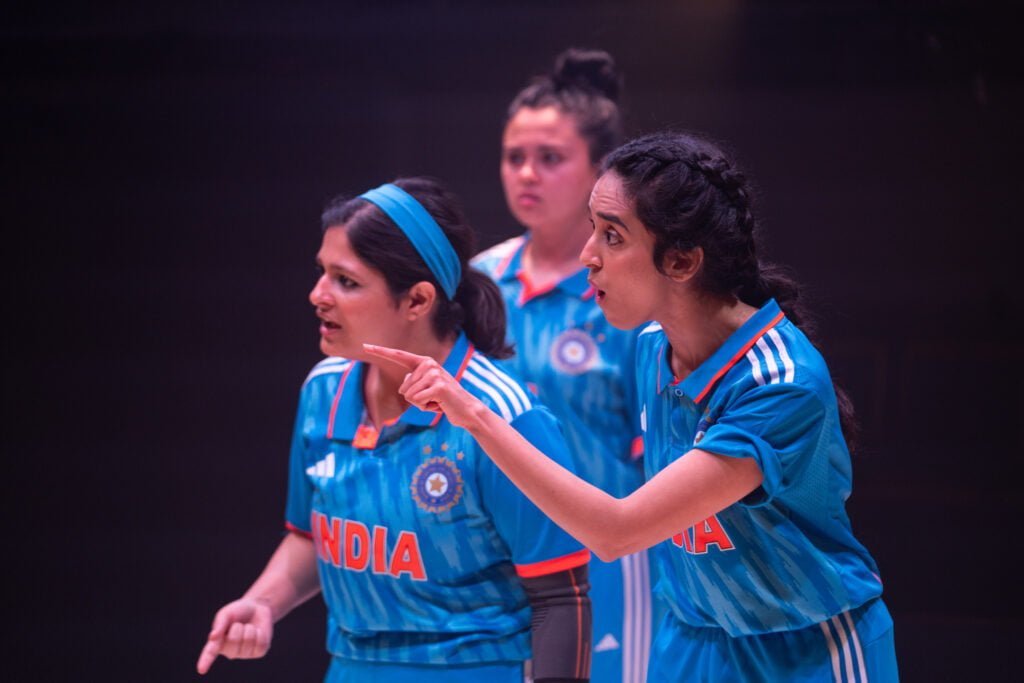Fair Play or Foul
“This is India. We’re not out of mangoes!”
ONE

Kate Attwell’s play about women’s cricket in the modern day and famine in colonial India in the 1700s seems a work of two disparate halves. In the first act, the one day match is rained off after the Indian team has set an impressive target. The players are trapped there hoping that the rain will stop.
The all female cast discuss boyfriends and girlfriends, competitive cricket, the weather and their future in the game. The English captain 1 (Bea Svistunenko) seems very tense and explodes actually breaking her bat. The crux of this half is corruption, match fixing by playing badly so as to benefit people betting on details of one innings or one over, and being rewarded by payment.
As far as I know the only accusations against English cricketers, apart from those made in 2016-17 by Al-Jareeza who have only supplied edited material to the ICC, has been of ball tampering with sand and saliva. I cannot find any accusations towards the women’s team but this is drama.
The Second Act is discussions between two members of the East India Company (bewigged Bea Svistunenko as ONE and Haylie Jones as TWO) partially about over arm bowling having been invented by women whose skirts would get caught up in an underarm thrown ball. The place is India during the Great Bengal Famine of the 1770s. The other dialogue in this scene is satirical representation of the East India grandees in a scene which has the humour and ridicule of Blackadder.

The accusation here is that the East India Company prioritised the growing of poppies for opium and indigo for dyeing fabric over rice. The result claimed in Test Match was that rice became twelve times as expensive. History tells us that there were other additional reasons for the deaths of between seven and ten million people, crop failures and drought.
I find it trivial to compare the deaths of millions of people with corruption in cricket. If this play is an attack on British capitalism, these statistics from the LSE’s survey of wealth in October 2023 make interesting reading. The typical white Briton has a household net worth of £140,000. Ethnic minority groups in Britain, at all levels of wealth, are substantially less well off than white Britons, shows the report. The exceptions are British Indians who have a typical household net worth of £160,000.
The performances in the First Act are interesting and Tanya Katyal doubles as an Indian player who overhears the discussions on money and in the Second Act, as the servant Abhi, she is party to the colonial conversation. Her reading of the rules of cricket in a strong Indian accent makes these even more intelligible!
The set is white carpeted disc and because it did not revolve, there were times when I could see neither the face of the person speaking nor that of the person being spoken to. Diane Page is the director. There is audience participation bowling in the interval but not with a hard cricket ball.

Production Notes
Test Match
Written by Kate Attwell
Directed by Diane Page
Cast
Starring:
Bea Svistunenko
Haylie Jones
Tanya Katyal
Aiyana Bartlett
Aarushi Riya Ganju
Mia Turner
Creatives
Director: Diane Page
Designer: Cat Fuller
Movement Director: Steven Hoggett
Lighting Designer: Rajiv Pattani
Sound Designer: Simon Slater
Fight Director: Ruth Cooper-Brown
Information
Running Time One hour 50 minutes including an interval
Booking to 18th May 2024
Theatre:
Orange Tree Theatre
Rail/Tube: Richmond
Reviewed by Lizzie Loveridge
at the Orange Tree
on 24th April 2024

